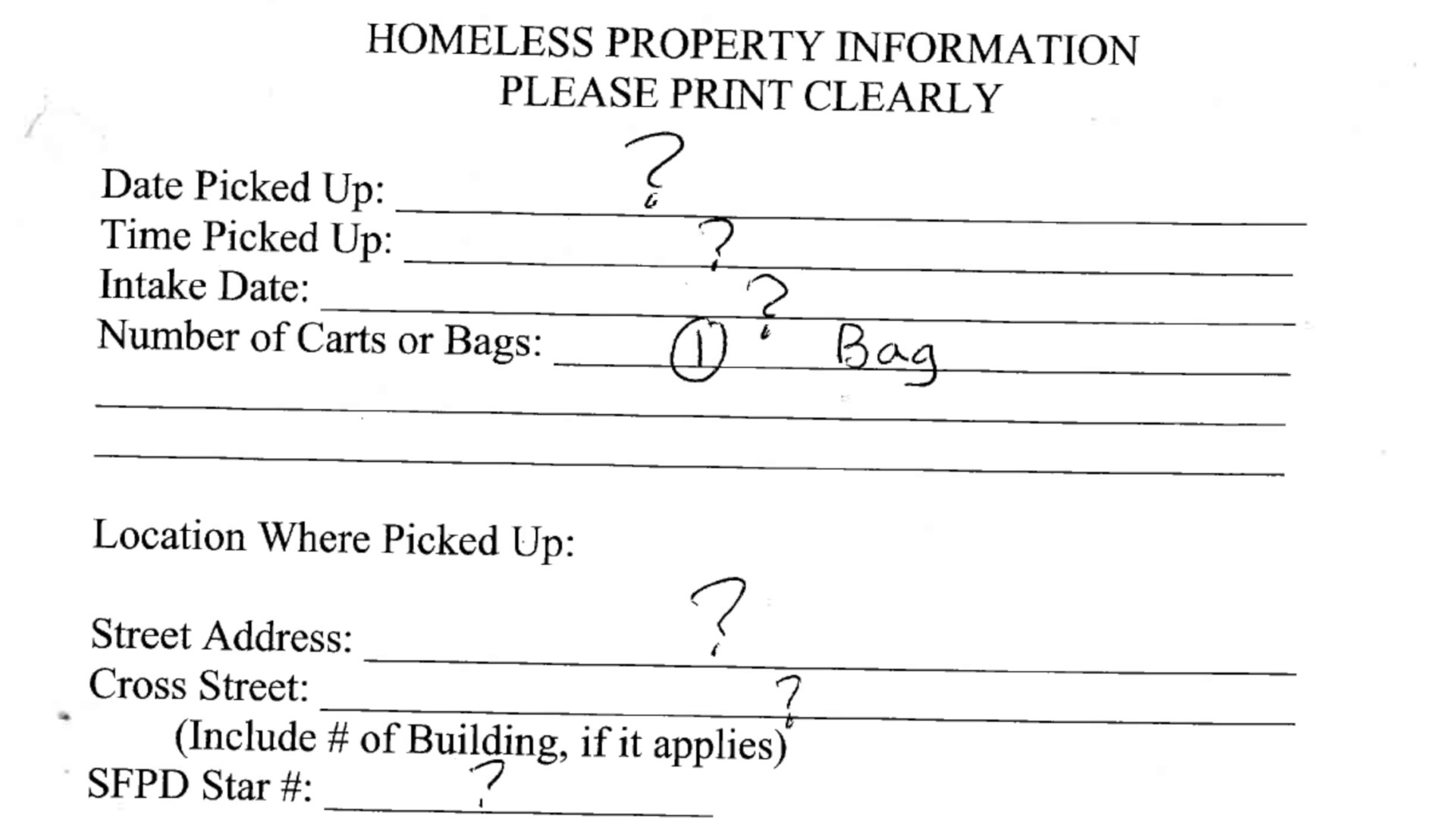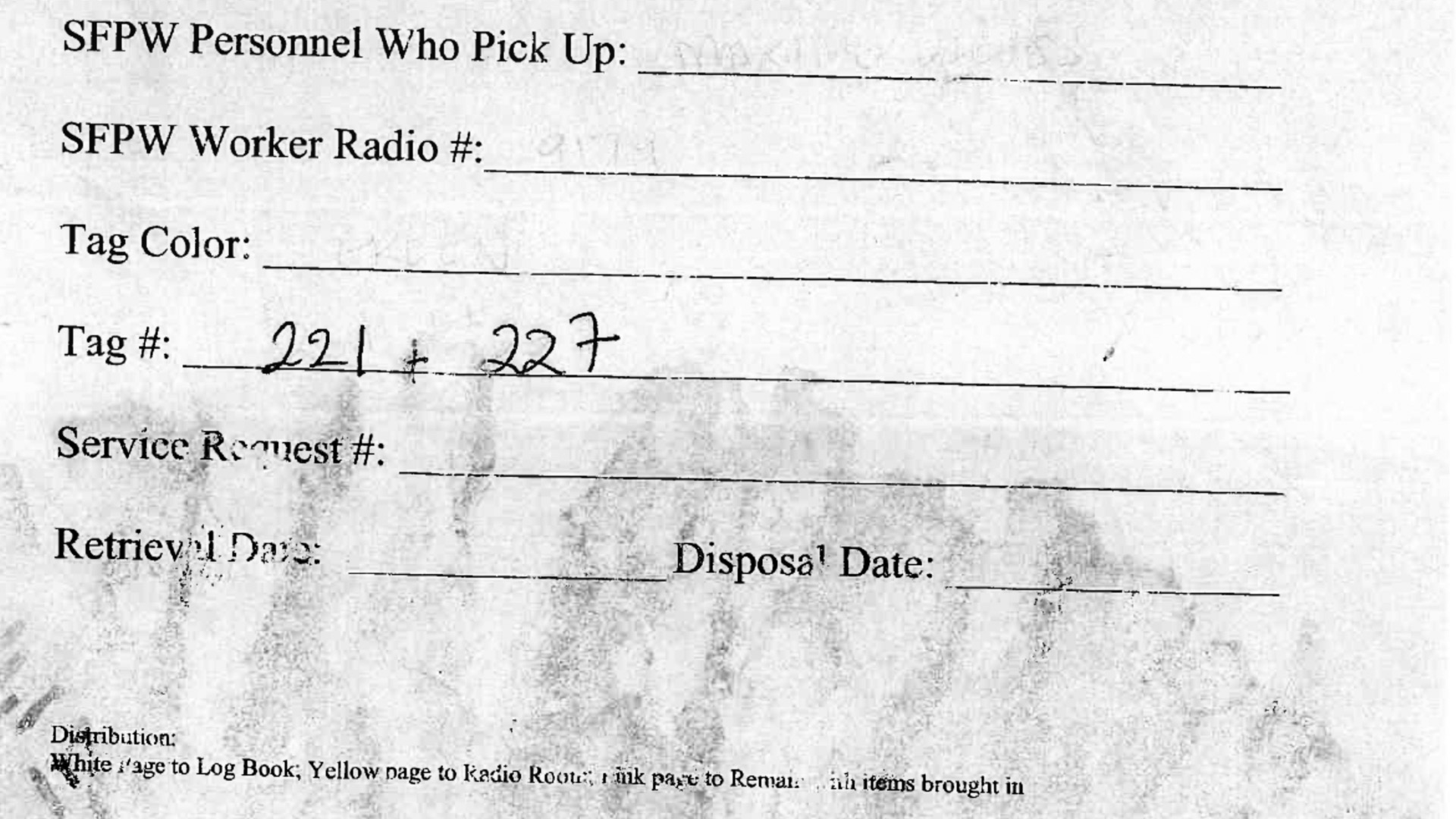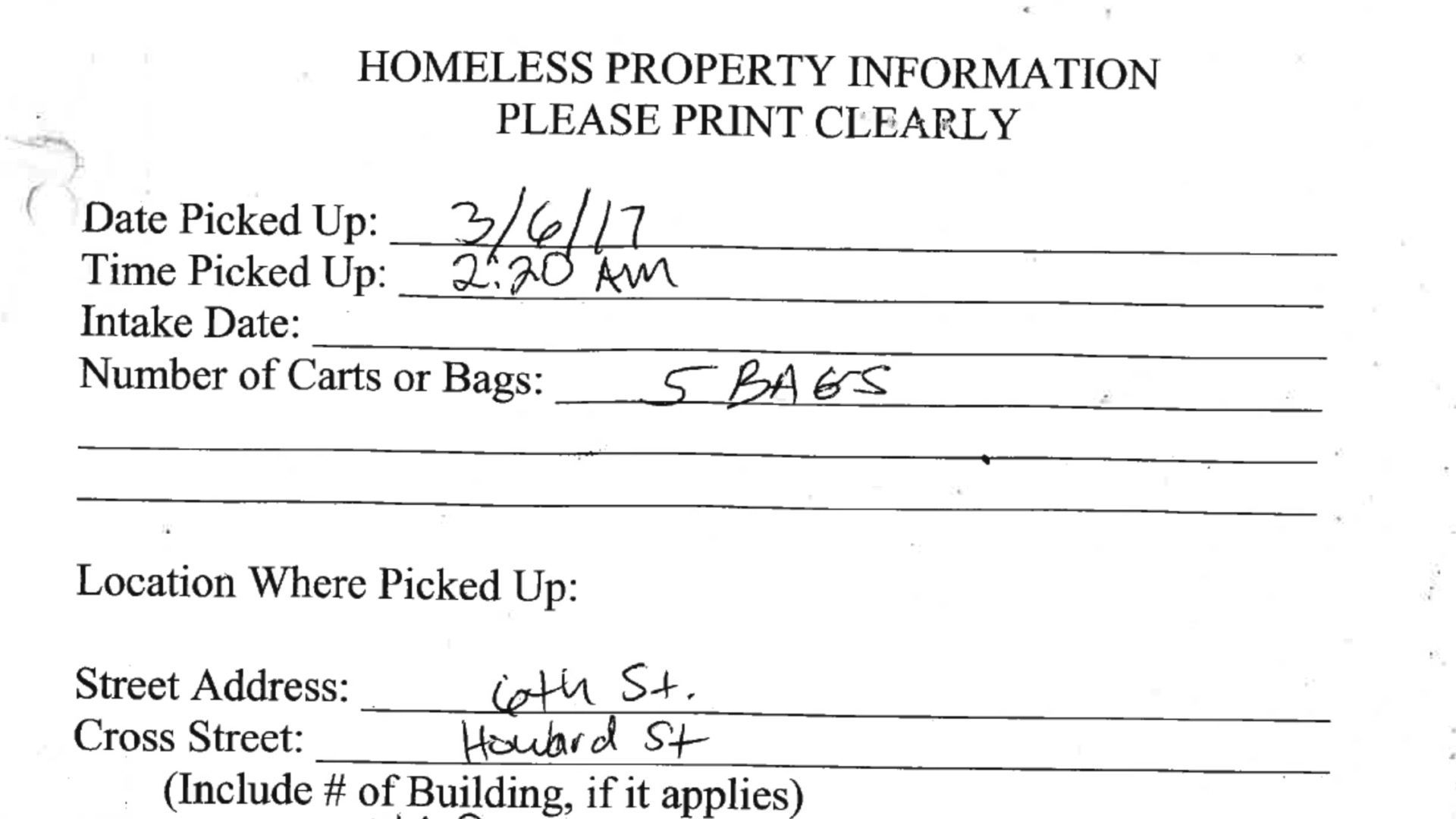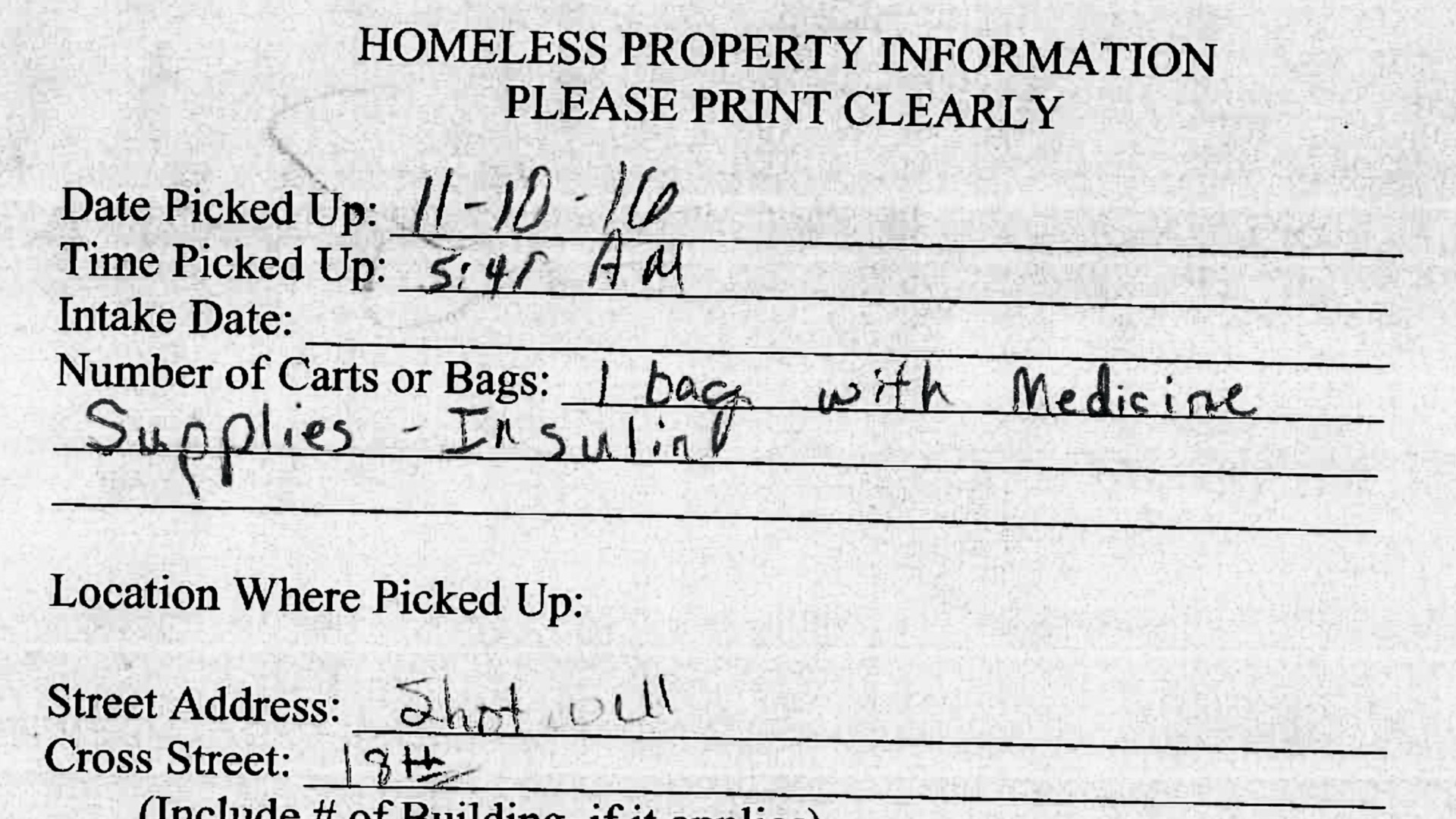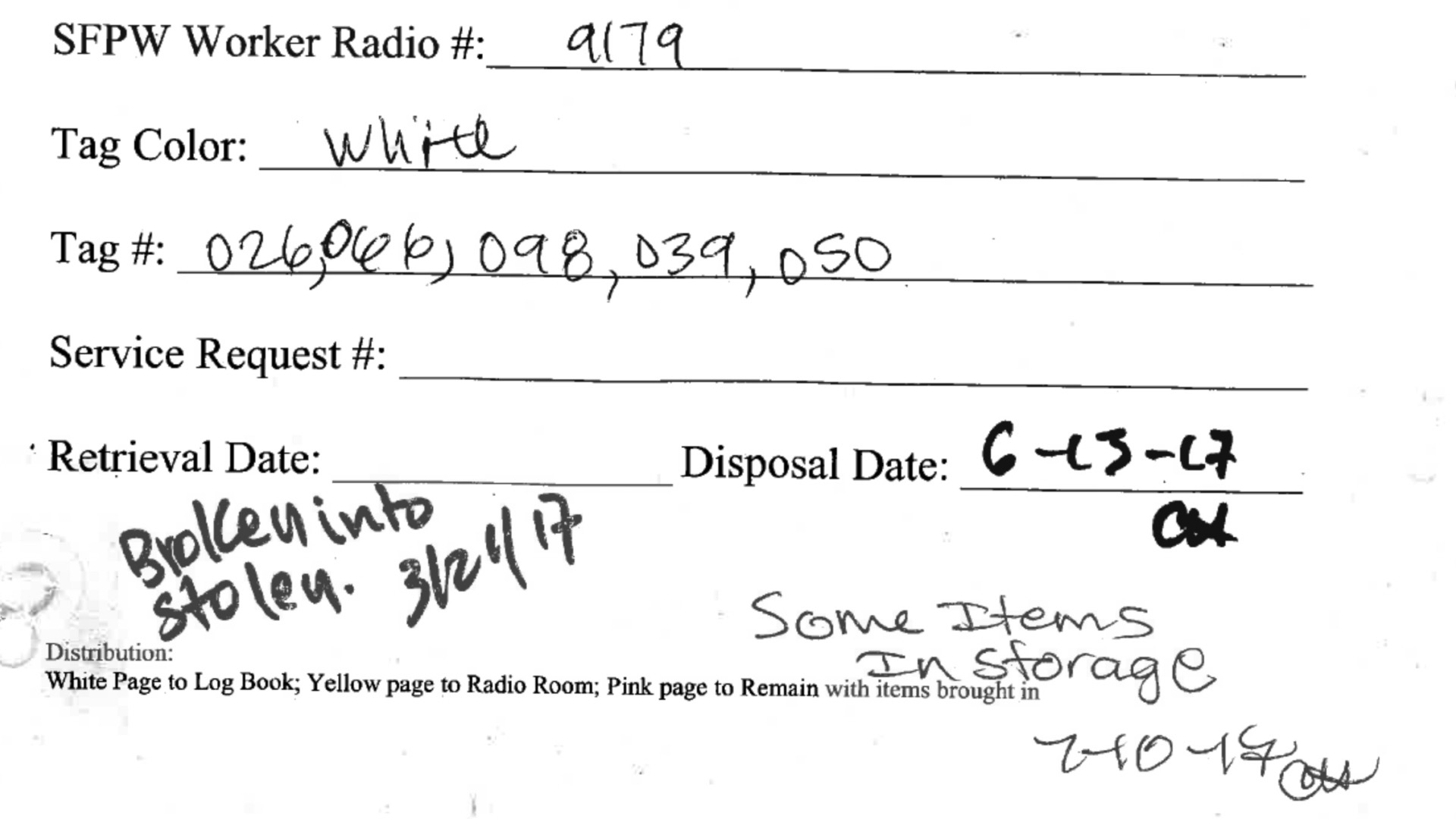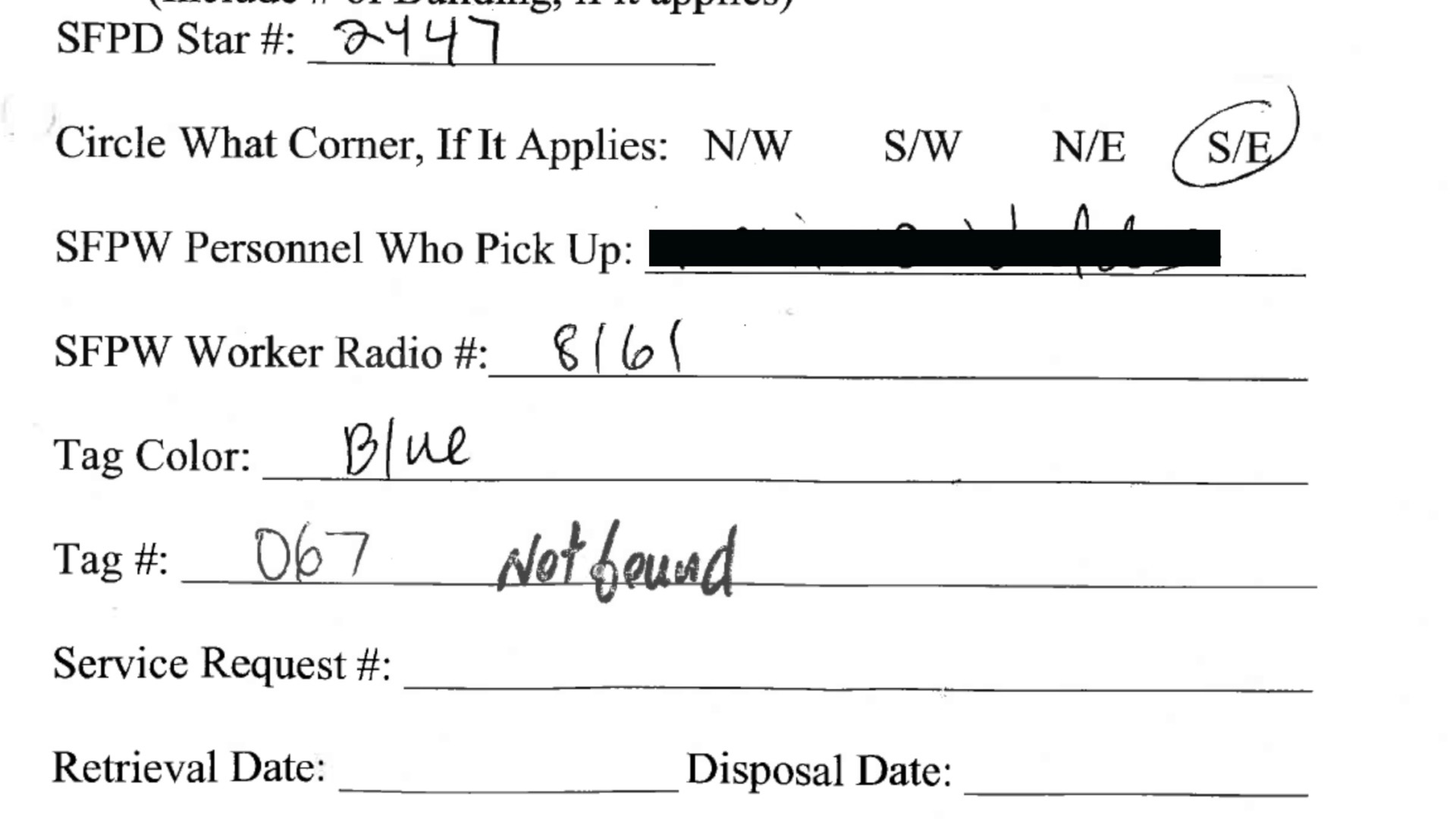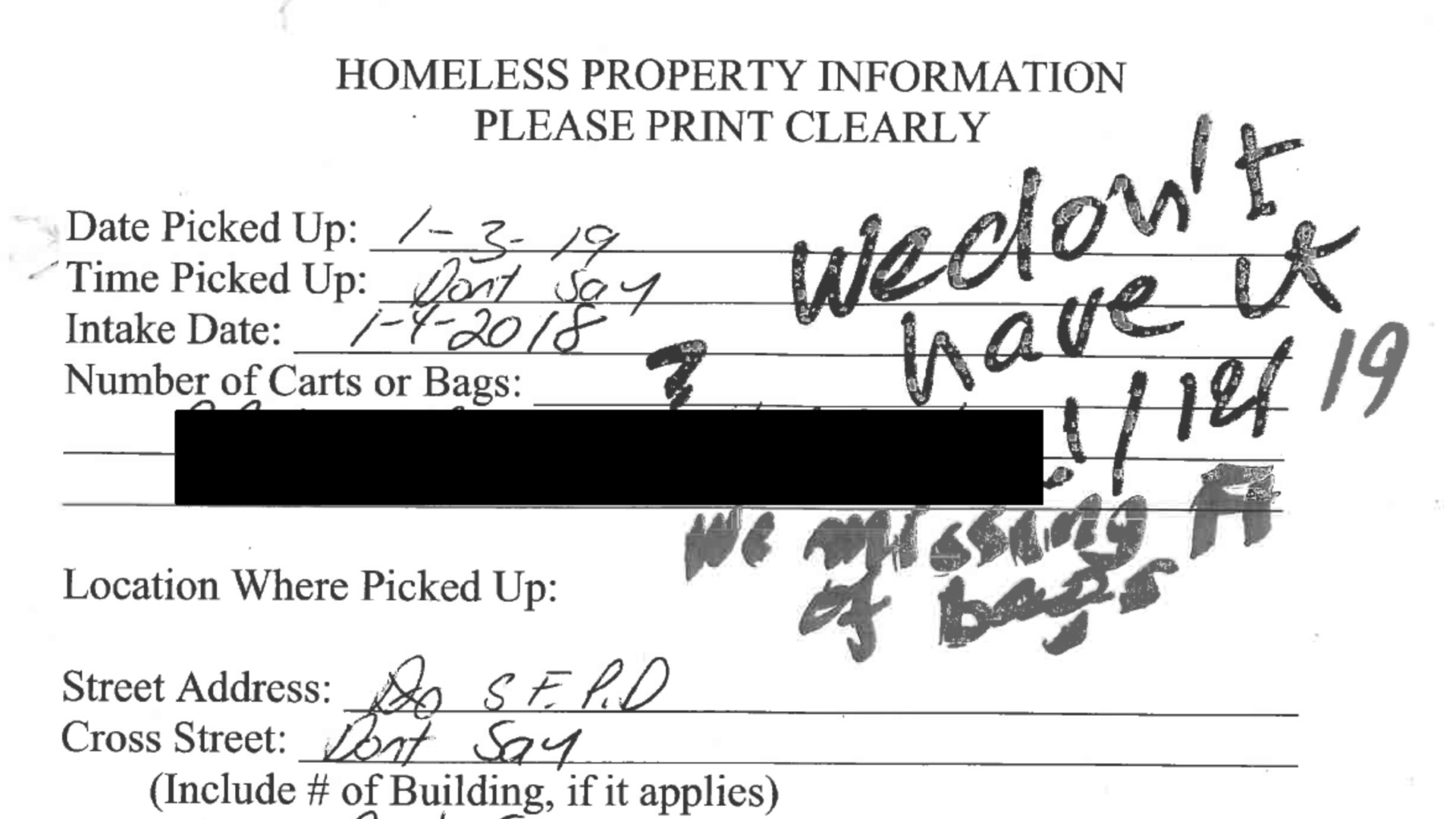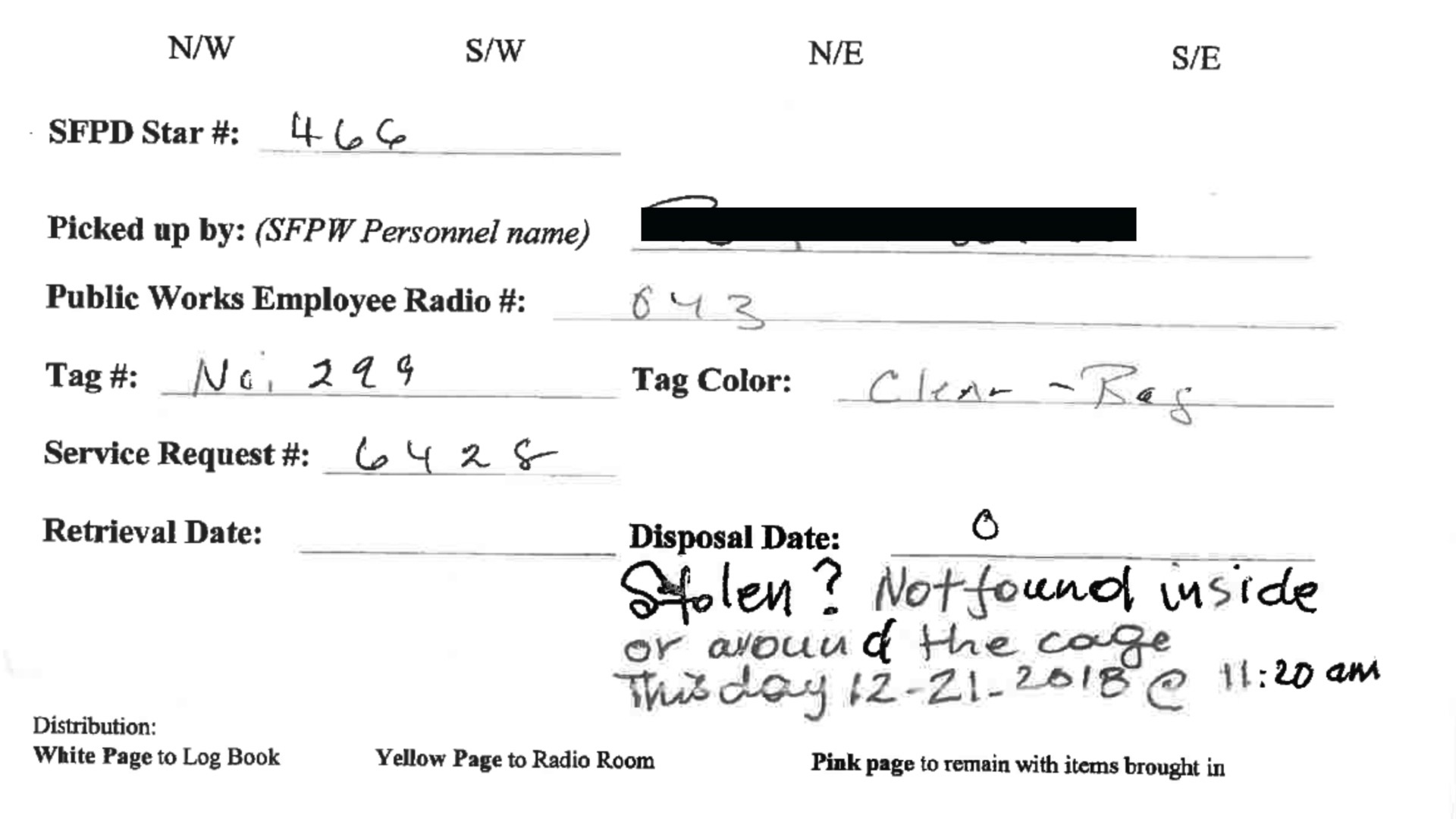Stolen Belonging Project Interview With Former DPW Worker
Disclosing Human Rights Violations, Theft and City Workers Profiting off items they take in the sweeps
Recorded in 2019
[See below for: Interview audio recording; full transcript; DPW/SFPD “Bag and Tag”/”Homeless Property Information” forms obtained through a public records request. Press release and news here.]
The Stolen Belonging project has been interviewing homeless residents all over SF and documenting the belongings taken from them during the city sweeps. In the process we were able to connect with and interview someone who worked at the Department of Public Works, who gave us an inside perspective on what city workers are ordered to do and what is actually happening to the belongings taken by the city every day.
San Francisco Police Department and the Department of Public Works are stealing and trashing houseless residents’ survival gear, medication and personal possessions in violation of human and constitutional rights, and often in violation of SF's own city policies. The former DPW employee discloses that some city workers are also selling or keeping these belongings and, also, that they have never been trained on proper city regulations or procedures. Check out our video “CITY AS THIEF” which reveals SF’s crimes against homeless residents
FULL TRANSCRIPT
FORMER DPW WORKER: Hello, I'm a former DPW and I was working there recently.
INTERVIEWER(S): Did you ever come upon homeless encampments or people's belongings when you worked for DPW?
FORMER DPW WORKER: Yes.
INTERVIEWER(S): And what did you do with those items that you came upon?
FORMER DPW WORKER: The company and the supervisors would say to throw the belongings away, like their tents and all that and their clothing and their belongings they got.
INTERVIEWER(S): Okay. Would your supervisors ever tell you about the correct policy?
FORMER DPW WORKER: Yeah, I was never trained to see the policy and the rules and all that. They never told me nothing, to do none of that.
INTERVIEWER(S): You just followed the supervisors?
FORMER DPW WORKER: I just followed the boss' commands what to do, so that was about it.
INTERVIEWER(S): And how many times would you guys show up in tandem with the police department?
FORMER DPW WORKER: Uh, maybe like twice a day maybe?
INTERVIEWER(S): Twice a day? Did you show up on your own more often or was it usually with the police?
FORMER DPW WORKER: Uh, their own, and they would do it like the wee hours in the morning.
INTERVIEWER(S): Would the police have witnessed you guys destroying...?
FORMER DPW WORKER: Yes.
INTERVIEWER(S): And they never said anything?
FORMER DPW WORKER: No. Sometimes [homeless people] just leave their stuff there. So we got no choice but to just throw it away, and then they'll try to come back and say where's their stuff at, so...
INTERVIEWER(S): But when someone's there, how often...?
FORMER DPW WORKER: Well, we'll try to tell them to move slow, you know, like nicely.
INTERVIEWER(S): But once you've decided, or you've been ordered by police, to confiscate their stuff? Do you give them any sort of receipt? Do you bag and tag it?
FORMER DPW WORKER: No
INTERVIEWER(S): Does it just go in the back of the truck?
FORMER DPW WORKER: Just toss it.
INTERVIEWER(S): So what happens at the DPW yard when these people come to get their stuff?
FORMER DPW WORKER: Their belongings?
INTERVIEWER(S): Um, hm.
FORMER DPW WORKER: Well, they'll try to get them back, but it's too late.
INTERVIEWER(S): It's usually gone?
FORMER DPW WORKER: It's gone.
INTERVIEWER(S): Why is it gone?
FORMER DPW WORKER: They sell it.
INTERVIEWER(S): Who sells it?
FORMER DPW WORKER: The DPW workers, on the weekend.
INTERVIEWER(S): Where do they sell it?
FORMER DPW WORKER: At the flea market on 16th/Mission. Like if the items look good and stuff, they say, “Oh, we can sell this. This looks good enough to sell.”
INTERVIEWER(S): Who's usually buying it?
FORMER DPW WORKER: People in the street and stuff. Public people.
INTERVIEWER(S): Um, ... back up one step to the DPW yard again. Was there a process, when you take it to the yard, of logging in that you got a bunch or bulk of items from a specific place?
FORMER DPW WORKER: No, it was just regular trash.
INTERVIEWER(S): So... when you went, you didn't say, "this pickup, the stuff in the back of this truck, is from this intersection"?
FORMER DPW WORKER: No, they'll just go to the big dumpster and start unloading it, and whatever that looks good to them they go sell it on the weekend and try to make money off of it.
INTERVIEWER(S): Did the other workers go through and just take what they wanted and then throw everything else away?
FORMER DPW WORKER: Oh, they'll throw everything away and then go through it.
INTERVIEWER(S): And where did they throw this stuff away?
FORMER DPW WORKER: It's like uh, where the dumpsters at, and then they go look through it and stuff.
INTERVIEWER(S): So do they do that at the storage yard on Kansas?
DPW Worker: Yes.
INTERVIEWER(S): They do it on the DPW property at the storage yard?
FORMER DPW WORKER: Yes, yes, yes.
INTERVIEWER(S): And when they go through it, is it just the workers that confiscated the property or do other workers at the DPW...?
FORMER DPW WORKER: Just the workers that got it. Pretty much crooked ones. They'll do it like when there's nobody around.
INTERVIEWER(S): Do any of the workers decide to keep some of the stuff instead of sell it?
FORMER DPW WORKER: Sometimes.
INTERVIEWER(S): What are some things that you think they take out and try to sell?
FORMER DPW WORKER: Electronics, laptops I see, phones. Everything, yeah. Whatever they can get...
INTERVIEWER(S): What do they normally do with the tents?
FORMER DPW WORKER: Um, well if they don't remove them then they'll tear them apart and throw them away.
INTERVIEWER(S): Were the supervisors also aware that this stuff was getting thrown away and/or sold or kept?
FORMER DPW WORKER: Well, not sold, but they know that it was getting thrown away.
INTERVIEWER(S): How do you know that it was getting sold?
FORMER DPW WORKER: I've seen some of the workers and the stuff, and I'm like uh-uh.
INTERVIEWER(S): Wait, you've seen the workers at the swap meet?
FORMER DPW WORKER: Yes. Yeah, I did walk in there on the weekend and seen some of the workers selling stuff.
INTERVIEWER(S): And you knew that stuff was from the pickups, from the sweeps?
FORMER DPW WORKER: Yeah. Yes.
INTERVIEWER(S): Did the police know that you all were taking it and that you've sold it before?
FORMER DPW WORKER: They don't know that.
INTERVIEWER(S): Do the police know that it's just being taken somewhere and thrown away?
FORMER DPW WORKER: Yeah, and thrown away. That's about it.
INTERVIEWER(S): The stuff that they're taking, can you tell it's abandoned, or can you tell that somebody probably lives there and is probably just gone for a minute?
FORMER DPW WORKER: Yeah, sometimes they do that. Like if they leave for awhile and nobody comes, they'll just take it and throw it.
INTERVIEWER(S): What happens if that person is gone, but they have a neighbor that tells you or tells the police, "It's not abandoned. He's gone. He's going to be back."
FORMER DPW WORKER: They'll still take it.
INTERVIEWER(S): And what do they do after they take it?
FORMER DPW WORKER: They'll try to argue and all that. Fight you. That's when the cops come because we can't do nothing to them.
INTERVIEWER(S): When you guys come upon the abandoned property, and it's in the back of the truck, and the person comes back and says, "hey, that's my stuff." Then the cops do what?
FORMER DPW WORKER: Well they tell them it's too late, you shouldn't have left it here.
INTERVIEWER(S): Once it's in the truck...?
FORMER DPW WORKER: Yeah, that's it. It's ours.
INTERVIEWER(S): So the policy says that you're supposed to fill out an intake form when you confiscate it and give it to the owner, and it's supposed to include the date, the time, the number of items, the description of the items, the location, the name of the owner, contact information, the police officer's badge number, the name of the staff of Public Works and the Staff Supervisor of Public Works, along with the service request number if it's from 311. How often does that ever get done?
FORMER DPW WORKER: Not really.
INTERVIEWER(S): Have you seen this? Have you ever filled one of these out? [Worker shown Personal Property Information / 'Bag and Tag' form]
FORMER DPW WORKER: No, I haven't. It's just the drivers and stuff. I would just be the one that's in the truck.
INTERVIEWER(S): Do you ever see the driver or the supervisor fill this out?
FORMER DPW WORKER: No. Maybe once, twice. That's it.
INTERVIEWER(S): And you're also supposed to leave this notice behind to let people know that we took your stuff. Do you ever see that one being filled out? [Worker shown SF Department of Public Works Notice of Removal of Property form]
FORMER DPW WORKER: No, no.
INTERVIEWER(S): How often is there a warning before you confiscate stuff?
FORMER DPW WORKER: Well they give them like, I'd say 15 minutes.
INTERVIEWER(S): 15 minutes?
FORMER DPW WORKER: Yup.
INTERVIEWER(S): The policy of DPW is 25 minutes. Do you ever give 25 minutes?
FORMER DPW WORKER: Maybe 20 at the most.
INTERVIEWER(S): If someone says, "Why are you taking my property? It's not blocking the sidewalk. It's not dirty."
FORMER DPW WORKER: Oh, they tell them, well, you can't be here. You have to keep moving.
INTERVIEWER(S): And if they don't move, you take the property.
FORMER DPW WORKER: Yeah.
INTERVIEWER(S): And so after you've given them 15 to 20 minutes, which, again, is not following DPW policy. Anything that's left and not packed up, you just immediately confiscate?
FORMER DPW WORKER: Yes.
INTERVIEWER(S): Do you act any differently when the police are there?
FORMER DPW WORKER: No.
INTERVIEWER(S): The police condone it? The police are fine with this?
FORMER DPW WORKER: Uh huh.
INTERVIEWER(S): What happens when they say we're going to arrest you unless you give us your tent. Where does that tent go?
FORMER DPW WORKER: They'll throw it in the back of the truck and tear it apart.
INTERVIEWER(S): And then throw it away? It does not get stored for evidence?
FORMER DPW WORKER: No. It gets tossed up.
INTERVIEWER(S): It goes to the same place?
FORMER DPW WORKER: Same everything.
INTERVIEWER(S): We have stories of people that have lost their families ashes, you know, their medicine, baby books. Have you, um, ...
FORMER DPW WORKER: I never seen that yet? Not when I was there.
INTERVIEWER(S): But when you throw away everything, do you all ever think about what else some of those things are that are in the tent?
FORMER DPW WORKER: Not really. Yeah.
INTERVIEWER(S): So when you confiscate a tent, do you bother emptying it out, or you just take the tent and whatever is in there and throw it in the back of the truck.
FORMER DPW WORKER: Just take the whole thing.
INTERVIEWER(S): What happens when people go through it and find medication? Personal items?
FORMER DPW WORKER: They don't care.
INTERVIEWER(S): So... they go through all this at the yard, right? And say they find someone's ashes or medication. They still just throw it away even though they're supposed to keep it for 90 days?
FORMER DPW WORKER: Yeah, they just throw it, toss it.
INTERVIEWER(S): So do you even know about the policy of keeping it for 90 days?
FORMER DPW WORKER: No, not really, not that.
INTERVIEWER(S): Did anyone ever tell you that the policy, unless it's a bulky item that doesn't fit into a 60 gallon container, cannot be thrown away, and that includes tents?
FORMER DPW WORKER: No.
INTERVIEWER(S): That was never part of the training? Supervisors never mentioned that?
FORMER DPW WORKER: No. They just said whatever out there that makes it look bad, take care of it and get rid of it.
INTERVIEWER(S): The few times that you've seen this form filled out and given to the property owner was there anything different about that situation that caused the supervisor to actually hand this out? [Worker shown DPW Personal Property Information/'Bag and Tag' form]
FORMER DPW WORKER: No.
INTERVIEWER(S): Just random?
FORMER DPW WORKER: Yeah.
INTERVIEWER(S): Beyond your supervisor, did anyone higher up tell you the policy is to throw everything away?
FORMER DPW WORKER: Yes, the supervisor and the boss.
INTERVIEWER(S): The supervisor and the boss. When the police would ask you to confiscate a tent that was confiscated under threat of arrest, did they tell you to throw it away?
FORMER DPW WORKER: If it was necessary, yeah.
INTERVIEWER(S): So the police would say destroy this?
FORMER DPW WORKER: Yeah, just smash it up, toss it.
INTERVIEWER(S): If you confiscated property from multiple owners, did it all just go in the back in the same pile in the truck?
FORMER DPW WORKER: Everything.
INTERVIEWER(S): At the scene of an encampment, did get people try to jump in the back of the truck to try to get their belongings, saying, "hey, this is my stuff."
FORMER DPW WORKER: They have, yeah, and they call the cops on that. That's the time the cops come.
INTERVIEWER(S): Have people ever gotten away with their stuff?
FORMER DPW WORKER: No. They would try to fight them, but that's when they get arrested. So...
INTERVIEWER(S): Did any of your coworkers ever talk about the impact that this has on people's lives?
FORMER DPW WORKER: No. They’re just trying to clean up San Francisco, they said.
INTERVIEWER(S): So when you saw people really probably emotionally impacted by having everything they own thrown way, did anybody even comment on that?
FORMER DPW WORKER: No. Like they had no heart, nothing.
INTERVIEWER(S): Can you tell us why you left DPW?
FORMER DPW WORKER: I didn't like the way they worked it.
INTERVIEWER(S): Anything else?
FORMER DPW WORKER: That's it. I didn't like the job either. It's too messy for me. I moved bigger, you know, so ... better, better company.
INTERVIEWER(S): For almost 5,000 homeless people that there's no shelter capacity for and there's no treatment bed capacity for, a tent is often the only protection and safety that they have.
FORMER DPW WORKER: Yes.
INTERVIEWER(S): Was it ever mentioned or thought about how unsafe confiscating their shelter or their property?
FORMER DPW WORKER: No.
INTERVIEWER(S): How often did public health workers or Department of Homelessness and Supportive Housing employees ever accompany you guys on these sweeps? That's the HOT team.
FORMER DPW WORKER: Never.
INTERVIEWER(S): If you could freely say anything to your previous coworkers about this, especially now after understanding our project and us trying to highlight all the belongings stolen, is there anything you'd like to share with them if they would be open to hearing it from you?
FORMER DPW WORKER: Well if they hear this then, you know, it's like, it's not right to do that to people that are out there and have no shelter or nothing, and you really can't, you know.
INTERVIEWER(S): Are you currently housed?
FORMER DPW WORKER: Yes.
INTERVIEWER(S): Can you say how you think you would feel if someone came and took your housing and all the belongings in it?
FORMER DPW WORKER: Yeah, if that was my situation, I'd be upset, and, you know, that would make me upset too.
INTERVIEWER(S): What would you do?
FORMER DPW WORKER: Well, I will try everything that they do out there like try to save your only home you have. You really can't do nothing.
INTERVIEWER(S): How would you try to get justice or accountability for somebody taking your home and throwing it away?
FORMER DPW WORKER: Well, it's like, the people that are homeless they say they don't really got justice cause, you know, they're just anybody on the street.
INTERVIEWER(S): What would you say and what would you do at that moment when you looked and see nothing's there?
FORMER DPW WORKER: I'd be upset.
INTERVIEWER(S): Where would you go?
FORMER DPW WORKER: I'd try to go see if I can get some justice done. [subtle laugh]
INTERVIEWER(S): How?
FORMER DPW WORKER: I don't know. Just maybe take it in my own hands.
Homeless folks we've interviewed all over the city have shared detailed accounts of this abuse and about never getting their confiscated belongings back. They need housing and services, not sweeps and criminalization. Join us in holding the city accountable for these grave violations, and TAKE ACTION TO STOP THE SWEEPS!
Stolen Belonging Episode 2: City As Thief (Excerpt)
This excerpt shows how SF city workers are trashing, stealing and selling homeless residents' belongings. Check out the full "City As Thief" episode here.
Audio of Full Interview with Former DPW Worker
The following DPW/SFPD Homeless Property Information or “Bag and Tag” forms were acquired through a public records request. DPW and SFPD sweep residents all over the city and take their belongings every day. Thousands are impacted every year. However, our public records request revealed that the city only logged approximately 60 ‘bag and tag’ forms in 2016, 70 in 2017, and 400 in 2018. Many of the forms aren’t fully completed and contain little to no information. They reveal early morning sweeps, and even the city confiscating medication at 5:40am. They also show innumerable instances where items are stolen out of the DPW operations yard or marked “not found.”




